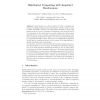Free Online Productivity Tools
i2Speak
i2Symbol
i2OCR
iTex2Img
iWeb2Print
iWeb2Shot
i2Type
iPdf2Split
iPdf2Merge
i2Bopomofo
i2Arabic
i2Style
i2Image
i2PDF
iLatex2Rtf
Sci2ools
WDAG
2005
Springer
2005
Springer
Distributed Computing with Imperfect Randomness
Randomness is a critical resource in many computational scenarios, enabling solutions where deterministic ones are elusive or even provably impossible. However, the randomized solutions to these tasks assume access to a source of unbiased, independent coins. Physical sources of randomness, on the other hand, are rarely unbiased and independent although they do seem to exhibit somewhat imperfect randomness. This gap in modeling questions the relevance of current randomized solutions to computational tasks. Indeed, there has been substantial investigation of this issue in complexity theory in the context of the applications to efficient algorithms and cryptography. In this paper, we seek to determine whether imperfect randomness, modeled appropriately, is “good enough” for distributed algorithms. Namely, can we do with imperfect randomness all that we can do with perfect randomness, and with comparable efficiency ? We answer this question in the affirmative, for the problem of Byzant...
Related Content
| Added | 28 Jun 2010 |
| Updated | 28 Jun 2010 |
| Type | Conference |
| Year | 2005 |
| Where | WDAG |
| Authors | Shafi Goldwasser, Madhu Sudan, Vinod Vaikuntanathan |
Comments (0)

